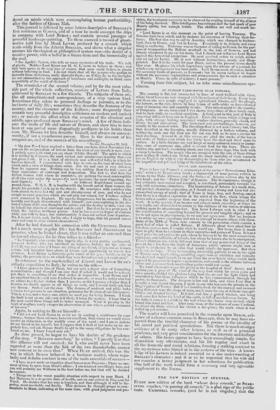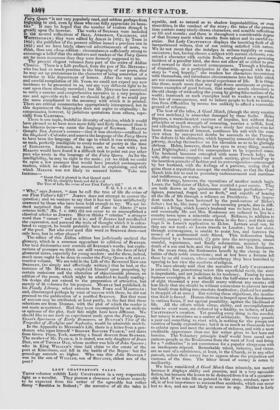THE NEW EDITION Or SPENSER.
EVERY new edition of the bard "whose deep conceit," as SHAK-. SPERE vouches, "is passing all conceit," is a glad sign of the public taste. CAMPBELL remarks, (and he is not singular,) that the Fr g Skirt.," i3 not very, popularly read, and seldom perhaps from Veginiaps. to .end, even. by those who can fully appreciate its beau- ties." It may be hoped that the number of readers through is greatly upon The ificrease. The works of SPEN,SER were included in the several collections of BELL, ANDERSON, CHALMERS, and WkITTINdlIAM ; they Were edited by AMIN in 1802; by Tomo in 1805; the 'publisher of the present edition issued a previous one in 1825; and we have lately. observed advertisements of more, we think, than one cheap edition : circumstances sufficiently strong to encourage a belief that the admirers and readers of the Fairy Queen are far more numerous than they were formerly supposed to be. The present elegant volumes form part of the series of Aldine Classics. There is a Life prefixed, ftom the pen of Mr. Mmoan ; who has had so much practice in the biography of our poets, that he may set up pretensions to the character of being somewhat of a tactician in this department of letters. After the very minute and careful compilation of Mr. TODD, we could not expect any new incidents to be presented to us, nor any very different light to be cast upon those already recorded; but Air. Merrome has contrived to write a concise and comprehensive narrative in a very perspicu- ous . and agreeable style : and we should be glad if we could pay the same compliment to the accuracy with which it is printed. There are critical commentaries appropriately interspersed, but in this department the biographer does not aspire to originality : he compensates, however, by Judicious quotations from others, espe- cially from CAMPBELL. There is one topic, fruitful in diversity of opinion, which it would have pleased us to have seen more fully and fairly discussed than it has hitherto been—we mean the language of SPENSER. MALONE thought BEN JONSON'S censure—that it was obsolete—confined to the ,Shepherd's Calendar, and asserts the language of the Fairy Queen to have been the language of the age in which it was written, and as such, perfectly intelligible to every reader of poetry in the time of Erazamern. Imitators, we know, are to be met with ; but MALONE would have found it a difficult task to point out any other poet who wrote in the language of the Fairy Queen. As for the intelligibility, he may be right in the main ; yet we think we could fix upon a few passages that would have puzzled contemporary readers, which no editor has succeeded in explaining, • and with which Mar.o.sz was not likely to succeed better. Take one instance-
" Great God it planted in that blessed stedd With his almighty hand, and did it call
The Tree of Life, the crime of our First Father's fall."
F. Q. b. I. c. xi. it. 40. "Why," says JORTIN, does he call the tree of life the crime of our First 'Father's CH?" JORTIN does not attempt to answer the question; and we venture to say that it has not been satisfactorily aliswered by those who have been bold enough to try. We are in- deed surprised that the command of Juno to Alecto (" sere erimina belli," /En. 7. v. 339) did not occur to so accomplished a classical scholar as JORTIN. HEYNE thinks " crimina" a stronger word than " eauste " and so it is ; and if JORTIN had recollected the expression, and pursued the train of thought which it is calcu- lated to suggest, he would probably have arrived at the intention of the poet. But who ever used this word as SPENSER does—not only here, hut in other places ? The editor of this Aldine edition has judiciously omitted the glossary, which is a common appendant to editions of SPENSER. Our best dictionaries now contain all SPENSER'S words; but expla- nations of passages we think are still wanting, in the form of brief glossarial notes, especially for young renders : anti for them, indeed, much more ought to be done to render the Fairy Queen a fit and at- tractive volume. We are told in the Life of the Reverend EDWARD Smonenv, (so simply and affectingly written,) that he had, at the instance of Mr. MURRAY, employed himself upon preparing, by certain omissions and the alteration of objectionable phrases, an edition of the poem, which might be admitted to family reading : his design did not extend to the preparation of attractive, Cut merely of fit volumes for his purpose. MURRAY had published, in his Family Library, select extracts from Foal) and Massmaut ; and; discouraged perhaps by want of success with these, he did not proceed to the publication of a purified SPENSER. But that want of success may he attributed, at least partly, to the fact that these selections are from Dramas, with the plot of which the reader is not made acquainted. Had they been accompanied by an analysis or epitome of the plot, their fate might have been different. We should like to see such an experiment made upon the Fairy Queen. ELLIS'S Specimens of Early Romances, or BerAvna's View of the Tragedies of yEschylus and Sophocles, would be admirable models. In the Appendix to MITFORD'S Life there is a letter from a gen- tleman who signs himself "ROBERT lioureax PEARCE," and dates from Grove Place, York, asserting a lineal descent from SPENSER. The mother of Mr. PEARCE, it is asserting was only daughter ofJOIIN DAY, on of Tuosins Day, whose mother was heir of John Spenser; who in King WILLIAM'S time laid claim to the estate of the poet at Kincoltnan, and fell in the battle of the Boyne: but the genealogy ascends no higher. Who was this Jain SPENSER? was he the son of WILLIAM, son of SILYANHS, eldest son of the poet ?



























 Previous page
Previous page